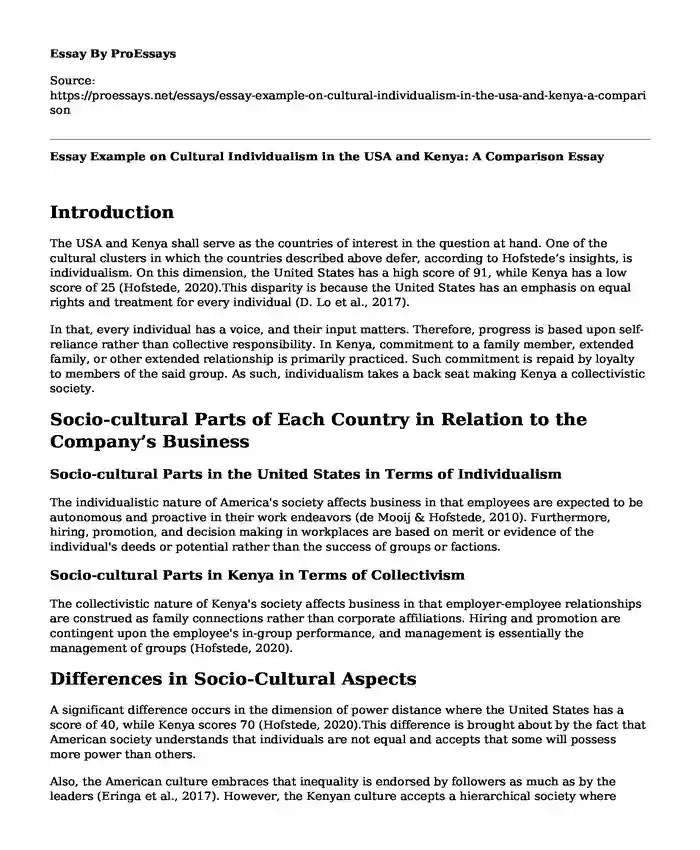Introduction
The USA and Kenya shall serve as the countries of interest in the question at hand. One of the cultural clusters in which the countries described above defer, according to Hofstede’s insights, is individualism. On this dimension, the United States has a high score of 91, while Kenya has a low score of 25 (Hofstede, 2020).This disparity is because the United States has an emphasis on equal rights and treatment for every individual (D. Lo et al., 2017).
In that, every individual has a voice, and their input matters. Therefore, progress is based upon self-reliance rather than collective responsibility. In Kenya, commitment to a family member, extended family, or other extended relationship is primarily practiced. Such commitment is repaid by loyalty to members of the said group. As such, individualism takes a back seat making Kenya a collectivistic society.
Socio-cultural Parts of Each Country in Relation to the Company’s Business
Socio-cultural Parts in the United States in Terms of Individualism
The individualistic nature of America's society affects business in that employees are expected to be autonomous and proactive in their work endeavors (de Mooij & Hofstede, 2010). Furthermore, hiring, promotion, and decision making in workplaces are based on merit or evidence of the individual's deeds or potential rather than the success of groups or factions.
Socio-cultural Parts in Kenya in Terms of Collectivism
The collectivistic nature of Kenya's society affects business in that employer-employee relationships are construed as family connections rather than corporate affiliations. Hiring and promotion are contingent upon the employee's in-group performance, and management is essentially the management of groups (Hofstede, 2020).
Differences in Socio-Cultural Aspects
A significant difference occurs in the dimension of power distance where the United States has a score of 40, while Kenya scores 70 (Hofstede, 2020).This difference is brought about by the fact that American society understands that individuals are not equal and accepts that some will possess more power than others.
Also, the American culture embraces that inequality is endorsed by followers as much as by the leaders (Eringa et al., 2017). However, the Kenyan culture accepts a hierarchical society where everybody is set at a certain societal level without further justification. Hierarchy in a corporation is intrinsically viewed to depict inequality (Hofstede, 2020).
Similarities in Socio-Cultural Aspects
Similarity occurs when the United States scores 62 and Kenya 60 on the dimension of masculinity (Hofstede Insights, 2020). This variation is minimal as both countries have similar cultures in this aspect. This means that behavior in school, work, and play in both countries is characterized by competitiveness as individuals strive to be the best they can within their sectors. In workplaces, employees receive recognition for their success, and this becomes the merit for hiring and promotion in corporations.
Effects of these Factors to the Company’s Business
Hiring, managing, and promoting employees in a Facebook Company based in the US would be more efficient since the American culture embraces an individualistic approach (Eringa et al., 2017). This means employees are used to being judged on individual performance rather than the collective. However, conducting the same in Kenya would be less efficient since it is a collectivistic society; hence a more befitting approach would need to be applied. E.g., applying synergistic strategies to improve work performance.
References
D. Lo, K., D. Waters, R., & Christensen, N. (2017). Assessing the Applicability of Hofstede's Cultural Dimensions for Global 500 Corporations' Facebook Profiles and Conten. Repository.usfca.edu. Retrieved 7 July 2020, from https://repository.usfca.edu/cgi/viewcontent.cgi?article=1021&context=olc.
de Mooij, M., & Hofstede, G. (2010). The Hofstede model Applications to global branding and advertising strategy and research. Retrieved 7 July 2020, from https://www.researchgate.net/publication/242542837_The_Hofstede_model_Applications_to_global_branding_and_advertising_strategy_and_research..
Eringa, K., N. Caudron, L., Rieck, K., Xi, F., & Gerhardt, T. (2017). How relevant are Hofstede's dimensions forinter-cultural studies? A replication of Hofstede's research among current international business students. Tandfonline.com. Retrieved 7 July 2020, from https://www.tandfonline.com/doi/pdf/10.1080/22243534.2015.11828344.
Hofstede, G. (2020). The 6 dimensions model of national culture by Geert Hofstede. Geert Hofstede. Retrieved 7 July 2020, from https://geerthofstede.com/culture-geert-hofstede-gert-jan-hofstede/6d-model-of-national-culture/.
Cite this page
Essay Example on Cultural Individualism in the USA and Kenya: A Comparison. (2023, Sep 25). Retrieved from https://proessays.net/essays/essay-example-on-cultural-individualism-in-the-usa-and-kenya-a-comparison
If you are the original author of this essay and no longer wish to have it published on the ProEssays website, please click below to request its removal:
- Negative Impacts of Social Media in the Society Essay
- The Impact of Starbucks Corporation on the Society - Paper Example
- Essay on Ontario Coroners: Unique Labor Divide for Medics & Crime Investigators
- Essay Sample on Data Sources in Mississauga Valley Community Centre
- Training & Development Programs: Enhancing Employee Satisfaction in Times of Distress - Essay Sample
- Essay Example on Technology's Place in Society: Then and Now
- Family Struggles: Examining Socioeconomic Impact of Cancer - Essay Sample







